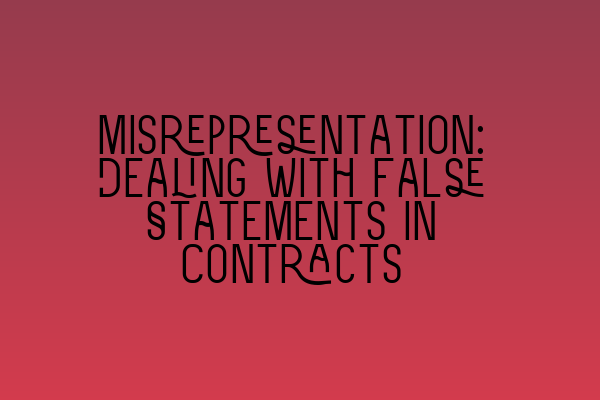Misrepresentation: Dealing with False Statements in Contracts

When entering into a contract, it is crucial to ensure that all involved parties are providing accurate and truthful information. Unfortunately, there are instances where false statements or misrepresentations can occur, leading to significant consequences for the parties involved.
In this blog post, we will explore the concept of misrepresentation in contracts, discuss its implications, and provide guidance on how to handle such situations effectively. Understanding misrepresentation and its legal ramifications is important for both solicitors and individuals involved in contract negotiations.
What is Misrepresentation?
Misrepresentation refers to the communication of false statements or facts by one party to another, with the intention to induce the other party into entering into a contract. The false statements can be made intentionally, negligently, or innocently. Regardless of the intent, misrepresentation can have severe consequences and may render a contract voidable.
There are three main types of misrepresentation:
- Fraudulent Misrepresentation: This occurs when a party knowingly makes false statements with the intention to deceive the other party. Fraudulent misrepresentation is a serious offense and can result in legal action.
- Negligent Misrepresentation: Negligent misrepresentation happens when a party makes false statements without taking reasonable care to ensure their accuracy. While the party may not have intended to deceive, they can still be held liable for the misrepresentation.
- Innocent Misrepresentation: Innocent misrepresentation happens when a party makes false statements honestly, believing them to be true. Although the party did not act dishonestly, they can still be held responsible for the consequences of the misrepresentation.
The Consequences of Misrepresentation
When misrepresentation occurs in a contract, it can have significant consequences for both parties involved. The innocent party may suffer financial losses, reputational damage, or be bound by terms they would not have agreed to if the misrepresentation had not occurred.
If the misrepresentation is proven, the innocent party may have the right to:
- Rescind the contract (i.e., terminate the contract and return to the pre-contractual position)
- Seek damages to compensate for any losses suffered as a result of the misrepresentation
- Claim for other remedies available under contract law depending on the circumstances
It is essential to note that whether or not a misrepresentation is grounds for rescission or damages depends on various factors such as the type of misrepresentation, the materiality of the misrepresentation, and the reasonable reliance of the innocent party on the misrepresentation.
Dealing with Misrepresentation
If you find yourself in a situation where you believe misrepresentation has occurred, it is crucial to take the following steps:
- Gather evidence: Collect any documents, emails, or other communication that supports your claim of misrepresentation. This evidence will be essential when proving your case.
- Seek legal advice: Consult with a solicitor who specializes in contract law. They will guide you through the legal process, evaluate the strength of your case, and advise you on the available options.
- Negotiate or mediate: Depending on the circumstances, it may be beneficial to engage in negotiation or mediation to resolve the dispute amicably without resorting to litigation. A skilled solicitor can assist you in reaching a fair settlement.
- Consider litigation: If negotiation or mediation fails, you may need to take the matter to court. Your solicitor will represent your best interests, present your case, and argue for the appropriate remedy.
Remember, the legal process can be complex and time-consuming, so having the support of a qualified solicitor throughout the process is crucial.
Conclusion
Misrepresentation is a serious issue that can have significant consequences for all parties involved in a contract. Understanding the different types of misrepresentation and their implications is essential for solicitors and individuals engaging in contractual agreements.
If you suspect misrepresentation has occurred or need advice on contract law matters, contact SQE Contract Law Solicitors. Our team of experienced solicitors can provide expert guidance, negotiate on your behalf, and represent your best interests in court if necessary.
Related Articles:
